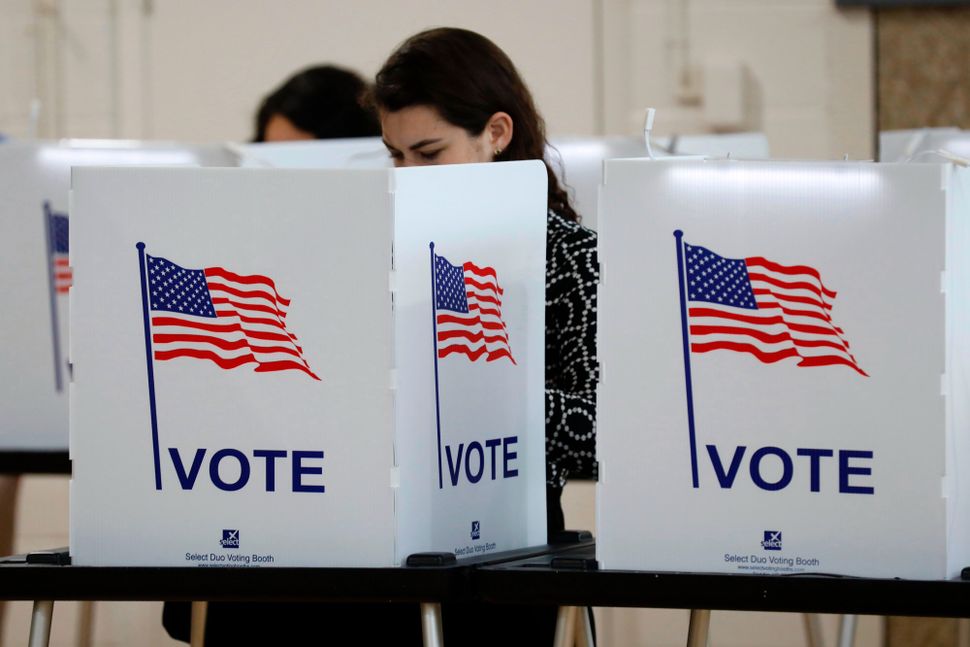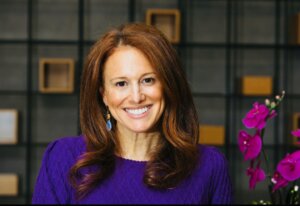Racial justice will drive Jewish votes in November

People vote in the Michigan primary election at Chrysler Elementary School in Detroit, Michigan, on March 10, 2020. – Voters in Michigan and five other states headed to polls early Tuesday in the latest slate of primaries that will decide whether Joe Biden or Bernie Sanders will face President Donald Trump in November. Idaho, Mississippi, Missouri, North Dakota and Washington state also vote Tuesday. (Photo by JEFF KOWALSKY / AFP) (Photo by JEFF KOWALSKY/AFP via Getty Images) Image by Getty Images
Over the Fourth of July weekend, President Trump made a calculated decision to give two incendiary speeches depicting a culture war in America. Painting a dark picture of “us versus them,” the president exploited our national holiday as an opportunity to defend Confederate symbols that are synonymous with racism.
Trump declared at Mt. Rushmore that efforts to remove Confederate statues “wipe out our history, defame our heroes, erase our values.” The next night at the White House, he continued, “We will never allow an angry mob to tear down our statues, erase our history, indoctrinate our children or trample on our freedoms.”
Donald Trump is on the wrong side of history in defending these symbols of hate and emboldening white nationalists, and he’s speaking to a dwindling number of supporters. Recent polls indicate that 15 million to 26 million people in the United States have participated in Black Lives Matter demonstrations, making it the largest movement in American history.
Calls for racial justice responding to the murders of George Floyd, Breonna Taylor, Ahmaud Arbery, and too many other Black Americans are not just about statues erected during the Jim Crow era. These statues have become a symbol of the real issue — racism and police brutality stemming from the dark legacy of slavery in our country.
Last month, I proudly marched alongside those calling for racial justice in front of the White House. The only history that demonstrators like me are seeking to rectify is that of systemic racism, the symptoms of which were portrayed so blatantly and horrifically when George Floyd was suffocated to death by a police officer.
One step toward reconciling our country’s original sin of slavery is to remove statues of Confederate leaders that serve as shrines for white nationalists. But this is hardly enough to end racism in America, and it’s not all that protesters are demanding. The Black Lives Matter movement is about transformative change to our laws, systems, policies, and values of those we elect. It’s about working to undo racism.
Jewish Americans like me have expressed solidarity with Black activists fighting for racial justice because it’s consistent with our values. Importantly, partnership between Black and Jewish Americans did not start with the murder of George Floyd or resistance to Donald Trump. It is not defined solely by this moment, nor will it end on November 3.
Our partnership predates the Civil Rights movement and is entrenched in our history and who we are as a people. It reflects our own struggle for freedom throughout history and is exemplified by our values and teachings, which include the concept of pikuach nefesh — the primacy and sanctity of human life — equality, and the pursuit of justice.
We cannot look away as three-plus years of racism emanating from the White House have opened the wounds of inequality, bigotry and injustice in America targeting communities of color, low-wage families, immigrants and refugees, Muslims and Jews. Since Trump was elected president, hate crime violence has reached a 16-year high according to the FBI, and violent acts of anti-Semitism reached an all-time high last year.
Instead of combating this deeply disturbing trend, Trump has embraced it and appears to be running for re-election on a platform of “four more years of hate.” In case his speeches weren’t evidence enough, he recently amplified calls for “white power” and is even campaigning with merchandise and ads that invoke Nazi symbols.
His campaign just sent a letter to supporters peddling an anti-Semitic conspiracy theory accusing prominent Jewish Democrats of “rigging the election,” and it’s not the first time. Trump invoked similar anti-Semitic conspiracy theories in the 2016 election and again in the 2018 midterms.
Jewish Americans have had enough. Over 70% of Jewish voters disapprove of the way Trump has handled the rise of anti-Semitism and nearly the same number feel less secure than they did two years ago, according to a national poll commissioned earlier this year by the non-partisan Jewish Electorate Institute.
Our rising insecurity is directly tied to Trump’s emboldening of white nationalists who have targeted our institutions and places of worship. It’s also because Trump professes to be protecting the values and freedoms of white nationalists, which are anathema to a majority of Jewish Americans. In his alternate reality, Donald Trump sees himself as the President of the “red” states as opposed to the United States. He is governing for a small subset of Americans who are white, Christian, and above all else, loyal to him.
The president has repeatedly demonstrated that he’s unwilling to serve as a leader for all Americans, and he’s made racism and hatred an issue that will drive votes in the 2020 election. The more Trump does to incite his base with bigotry, the more he inspires the rest of the country to support Joe Biden, who rightfully identified this dynamic as the “battle for the soul of our nation” after neo-Nazis marched in Charlottesville three years ago. This battle rages on today, and those of us fighting for racial justice, equality and an end to bigotry will take our fight straight to the voting booth.
The majority of Jewish Americans are fighting for Black lives, just as we’re fighting for an end to anti-Semitism, and we’ll soon have the chance to translate our advocacy into votes. What is happening in our country under Donald Trump is a far cry from the values imparted by our religion and others, and it must change.
It’s because of our values that many Jewish voters are compelled to take action to ensure that Trump and hatred he incites are defeated in November.
Halie Soifer is executive director of the Jewish Democratic Council of America (JDCA). She previously served as national security adviser in the Senate and House, and as a senior policy adviser in the Obama administration.

















